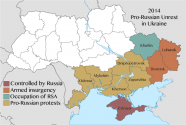"Putin’s stated vision for Russia and Ukraine is not absorption into a common state, but the sort of relationship that exists between the United States and Canada, in which people who share a common ancestry cooperate and profit from their relationship, while still having separate states."A more sober analysis of this Russia-Ukraine supposed invasion thing from the National Interest.
I found this passage on the article particularly interesting:
Why War is Off the Table, for Now
The most striking implication of Zelensky’s comments is that the war scare was made in the United States. To understand why Zelensky doesn’t think a war is imminent, we must go back to April when the first great scare of a Russian invasion occurred. The preceding year, Azerbaijan had demonstrated in its conflict with Armenia that Turkish and Israeli drones could smash entrenched positions and rout the defenders. The Atlantic Council, the eyrie of Washington’s Ukraine hawks, immediately noted the relevance of this demonstrated new capability to the frozen conflict in the Donbas.
The new team at the White House, closely following a script announced by the Atlantic Council, declared that Crimea and the Donbas must be put back on the table. That meant, explained a Biden official, a “very extensive and almost constant focus on Ukraine from day one.” In the view of Democrats, Donald Trump had been a shameless appeaser of Putin; indeed, he was Putin’s puppet. This narrative, to be sure, was dubious in the extreme, as Trump the ostensible appeaser surrounded himself with advisors—H.R. McMaster, Mike Pompeo, Nikki Haley, James Mattis, and John Bolton—who regularly blasted Russia in scalding tones. But though the narrative may have been wrong, it was theirs. The Democrats believed it. Where Biden and Secretary of State Antony Blinken largely followed Trump’s line on China, they broke sharply with him over Ukraine.
The Ukrainian government hailed the new administration and set forth a platform for the return of Donbas and Crimea. Then on April 3, 2021, Ukraine’s military announced on Facebook that military exercises would be conducted with five NATO powers in Ukraine’s eastern regions later in the year. “In particular,” it said, “defensive actions will be worked out, followed by an offensive in order to restore the state border and territorial integrity of a state that has been subjected to aggression by one of the hostile neighboring countries.”
Russia’s callup of reserves—which both now and in April was interpreted by U.S. intelligence as reflecting plans for a gigantic invasion—was in direct response to these three important developments: a startling new demonstration of the effectiveness of drone-led offensive operations, a new U.S. posture toward Ukraine-related issues that was far more aggressive than Trump’s, and the declaration by Ukraine’s military that they were working on a plan to drive the Russians out of the occupied territories. When Biden said in December that the United States would not commit forces to Ukraine in the event of a war, it took the legs out from under this plan.
The United States now vehemently denies that there was any idea of retaking the Donbas by force and that this is an invention of Russian propagandists. From the outside, it is impossible to know how far these plans advanced and how seriously they were taken, but to say that the Russians had no basis for thinking that something was afoot is clearly absurd. What is the explanation for the April 3 Facebook post by Ukraine’s military? Were they the unfortunate victims, like Joy Reid, of a malicious hack? If the Azerbaijani war had no military significance for the Donbas, why did the Atlantic Council argue that it did?
It is obvious that Ukraine’s military has sought an Azerbaijani-like capability in the past year, and little doubt that the United States has facilitated the acquisition of one. But it is equally obvious that no such plan can be put in motion if the U.S. attitude is what Biden and Blinken said it was in December. The Ukrainians were optimistic about getting such a pledge from the Americans during the previous year—that is, getting an American backstop if they sought to regain their lost territories by force, replaying the Georgia option of 2008 but this time with American guarantees. Their hopes are now deflated. Hence Zelensky’s taunt: just tell straight out that that we cannot join NATO, that is, that you intend to leave us in the lurch with regard to our lost territories."
David C. Hendrickson

